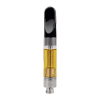What is HHC and how does it differ from THC?
HHC, or Hexahydrocannabinol, is a hemp-derived cannabinoid that offers similar effects to THC but without the intense psychoactive experience. It’s a great choice for those seeking the benefits of cannabinoids without the ‘high’.
What are the effects of HHC?
HHC can offer a sense of calm, relaxation, and well-being. It’s also been reported to help with pain management and sleep issues.
Is HHC legal?
Yes, HHC is derived from hemp and falls under the 2018 Farm Bill, making it legal in most U.S. states. Always check local laws to be sure.
Does HHC show up on drug tests?
While HHC is a different compound than THC, it may still trigger a positive result on drug tests due to similarities in their molecular structure.
Why might I choose HHC over THC?
If you’re seeking the therapeutic benefits of cannabinoids but want to avoid the intense ‘high’ associated with THC, HHC could be an excellent choice for you.
Are there any side effects of using HHC?
HHC is generally well-tolerated, but as with any substance, individual experiences may vary. Always start with a low dose and monitor your body’s response.
Understanding HHC and THC
When it comes to the world of cannabinoids, THC is often the first compound that comes to mind. But have you heard about HHC? Let's dive into what these two are and how they're derived.
HHC, or Hexahydrocannabinol, is a hemp-derived cannabinoid. It's a relative newcomer in the cannabinoid scene but has been gaining attention for its potential therapeutic benefits. Unlike THC, HHC offers similar effects without the intense psychoactive experience. This makes it an attractive option for those seeking the benefits of cannabinoids without the 'high'.
On the other hand, THC, or Tetrahydrocannabinol, is a well-known cannabinoid derived from marijuana. It's famous (or infamous) for its psychoactive effects - the 'high' that recreational users seek. However, it also offers therapeutic benefits such as pain relief and appetite stimulation.
> "HHC and THC may seem similar at first glance, but their differences lie in their origin, effects, and legal status."
Now, let's talk about how these compounds are derived. Both HHC and THC come from the cannabis plant, but their sources differ. HHC is derived from hemp - a type of cannabis plant with low THC content. On the other hand, THC is primarily derived from marijuana - a cannabis variant with high THC content.
For more detailed information on HHC and THC, check out this [article](https://hhcherb.com/article/understanding-cbd-hhc-cannabinoids).
- **HHC**: Hemp-derived, less psychoactive, potentially therapeutic - **THC**: Marijuana-derived, psychoactive, therapeutic but potentially intoxicating
In the next section, we'll compare the effects of HHC and THC to help you understand them better.

Comparing the Effects of HHC and THC
When it comes to the effects of HHC and THC, there's a lot to unpack. Both cannabinoids interact with our body's endocannabinoid system but in slightly different ways, leading to distinct experiences.
THC is renowned for its psychoactive properties. It binds directly with the CB1 receptors in our brain, leading to feelings of euphoria and altered sensory perception - the 'high' that marijuana is known for. On the flip side, it can also cause anxiety and paranoia in some individuals.
HHC, on the other hand, offers a milder experience. While it does interact with the CB1 receptors, it doesn't bind as strongly as THC. This results in a less intense psychoactive effect. Users often report feeling relaxed and calm without the overwhelming 'high' associated with THC.
Here's a quick comparison:
| | HHC | THC | |---|---|---| | **Psychoactive Effects** | Mild | Strong | | **Anxiety/Paranoia** | Less likely | More likely | | **Relaxation** | High | Moderate |
For a more detailed comparison of HHC and THC's effects, check out this [informative article](https://hhcherb.com/article/hhc-vs-thc-benefits-differences-downsides).
Remember, everyone's body reacts differently to cannabinoids. What might be a mild effect for one person could be intense for another. Always start with a low dose and gradually increase until you find what works best for you.

Legal Aspects of HHC and THC
When it comes to the legal aspects of HHC and THC, the landscape can be a bit tricky to navigate. Both compounds come from the cannabis plant, but their legal status varies significantly due to their different psychoactive properties.
THC, derived from marijuana, is classified as a Schedule I substance under federal law in the United States. This means it's illegal on a federal level, although some states have legalized it for medical and/or recreational use. However, traveling across state lines with THC products is still considered a federal offense.
On the other hand, HHC's legal status is a bit more lenient. Since it's derived from hemp, it falls under the 2018 Farm Bill's jurisdiction. This bill legalized hemp and all its derivatives, including HHC, on a federal level. However, each state can set its own rules regarding hemp products, so it's essential to check your local laws.
> "While THC remains federally illegal in the U.S., HHC enjoys a more relaxed legal status thanks to its hemp origins."
In Europe, the legality of HHC is still under discussion. Some countries allow it, while others have strict regulations against cannabinoids. For detailed information on the legality of HHC in Europe, you might find this [article](https://hhcherb.com/article/legality-of-hhc-in-europe) helpful.
- **THC**: Federally illegal in the U.S., but legal in some states - **HHC**: Federally legal under the 2018 Farm Bill, but state laws vary
Remember, laws are constantly changing. Always stay updated with your local regulations before purchasing or using any cannabinoid products.








